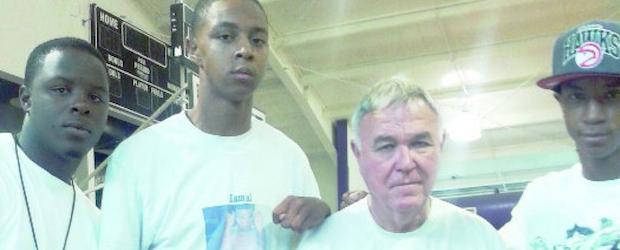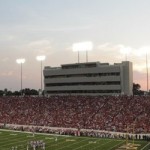 I answered my cell phone and heard that familiar, raspy voice on the other end of the line.
I answered my cell phone and heard that familiar, raspy voice on the other end of the line.
“Rex, it’s Coach Rip,” he said.
He didn’t need to identify himself. Those of us who have been involved in Arkansas sports know the man well. We know how he walks. We know how he talks. We know his cell phone number and the restaurants where he likes to eat.
Here’s what else I know: No one in the history of Arkansas sports has done more for underprivileged youth than Charles Ripley.
On a recent rainy day, he called me while en route back to Little Rock from an event in Memphis. He was dodging 18-wheelers on always-congested Interstate 40 and “hauling some boys back.”
For those of you who don’t know the man, let’s get the facts out there: Charles Ripley is white. He was an only child. He turned 68 years old on June 12. He never had children. In fact, he never married. But hundreds of boys – many of them now men – have thought of Ripley as almost a second father through the years. Most of those boys were black.
Charles Ripley is one of those men of whom I can truly say: “He sees no black or white. He only sees potential.”
In the 1980s and 1990s, Ripley led one of the top high school basketball programs in the country at Little Rock Parkview. The Patriots reached the state title game in 10 of his 21 seasons and won five of those title games. He took over the basketball program at the school on Barrow Road in the fall of 1974 and won state championships there in 1978, 1988, 1992, 1993 and 1995. His last team in 1995 was his best one, going 35-1 while losing only to a school from Fremont, Calif., during a tournament in Las Vegas.
An earlier Ripley-coached team defeated a squad ranked in some polls as the No. 1 team in the nation, St. Nicholas of Tolentine High School from the Bronx.
At the end of that 1995 season, one poll had Parkview ranked No. 4 nationally.
“The people who followed it said they thought we were the best team overall that year,” Ripley told an interviewer several years ago.
Ripley left Parkview to become the head basketball coach at Westark Community College, now the University of Arkansas at Fort Smith. Away from his native Little Rock for the first time in his life, Ripley was uncomfortable on the state’s far western border. When Parkview graduate Keith Jackson retired from professional football and created the P.A.R.K. program for children from low-income families, Ripley returned to Little Rock to run the gymnasium for Jackson.
In 2006, Fitz Hill, the Arkadelphia native and Ouachita Baptist University graduate who had been among just a handful of black head coaches in major college football when he was at San Jose State, took the job as president of Little Rock’s Arkansas Baptist College. Enrollment at the school had dwindled to fewer than 200 students.
The story of Arkansas Baptist and its survival through the decades is almost as inspiring as the story of Charles Ripley. The historically black liberal arts institution was founded in 1884 by the Colored Baptists of the State of Arkansas to train former slaves and the children of former slaves to be preachers and teachers. The first classes were held in the fall of that year at Mt. Zion Baptist Church in Little Rock. The name of the school was changed from the Ministers’ Institute to Arkansas Baptist College in August 1885 and the school moved to 16th and High Street (now Dr. Martin Luther King Jr. Drive), where it remains to this day.
Finances have always been a struggle at Arkansas Baptist and still are, as evidenced by news stories the past several months. But Ripley remains proud of the achievements at the school and optimistic about the future.
“Look, we serve what may be the poorest student body in America,” Ripley said over lunch at a North Little Rock restaurant. “We don’t have an endowment. We don’t get money from the United Negro College Fund. Probably 98 percent of our students depend on Pell Grants.”
The federal Pell Grant program provides need-based grants to low-income college students in an effort to promote greater access to postsecondary education.
“A lot of our students are kids that no other school would take a chance on,” Ripley said. “We handed out more than 130 degrees last spring. When I came over here, there weren’t 150 students total at the school.”
In 2006, Ripley was inducted into the Arkansas Sports Hall of Fame. Soon afterward, Hill invited Ripley to serve as athletic director.
Arkansas Baptist is a four-year institution and had competed at the NAIA level. Hill’s idea was that the athletic program should be a part of the National Junior College Athletic Association for freshmen and sophomore students while adding football. In 2007, Arkansas Baptist began fielding the state’s lone junior college football team. Years earlier, when Hill was the assistant head coach and recruiting coordinator under Houston Nutt at the University of Arkansas, Ripley had worked unsuccessfully with Hill in an attempt to establish a junior college football program at Pulaski Tech.
“We’re filling a void,” Ripley told The Associated Press on the eve of that first season in 2007. “Serving the underserved is our motto. Our foundation is taking care of our own. We don’t need other states taking care of our kids.”
That first Buffalo team went 0-8.
Ripley is quick to tell you that while wins are nice, the goal of the football program at Arkansas Baptist is to get black males who otherwise would never go to college into school.
“I would estimate that close to 70 percent of our students have been involved in athletics at one time or another,” Ripley said. “We have football, baseball, track and wrestling for men. We have softball, basketball and track for women. We even offer boxing as a club sport. In our men’s sports, there will be close to 200 students come out for football, 80 for baseball, 15 for track and 10 for wrestling. That’s huge for admissions. And the other students get behind these teams. Come over to one of our basketball games. We can only accommodate about 300 fans, but we pack the place. If those lights are on, our kids are there. They even packed the gym to watch an open tryout.”
In the summer of 2008, hundreds of central Arkansas’ best-known residents gathered at the Jack Stephens Center on the campus of the University of Arkansas at Little Rock to honor Ripley. Money was being raised for the Arkansas Baptist athletic program, and Little Rock businessman Scott Ford gave the largest donation in the history of the school that night so a dorm could be built and named for Ripley.
“He showed you every day that he loved you,” Keith Jackson said of Ripley. “There was no talking back because you knew he cared for you as a person. Coach Ripley has been a father to so many different kids, me included. A lot of us talk about that. He was sometimes the only older male figure in our lives. It’s so important having a shoulder to lean on when you need it.”
Even though Houston Nutt and his younger brothers played at Little Rock Central High School, they remember how boys would come from all over the city whenever Ripley would open up the Parkview gym, which is known as Rip Arena.
“You didn’t have to play at Parkview,” Nutt said. “Players from Central, Hall, all over, came over to Parkview when he opened the gym.”
Jackson said high school players would drive from across the state on summer days for games at the Parkview gym.
Some coaches claimed that Ripley was, in essence, recruiting.
Jackson told my colleague Jim Harris a few years ago: “Those coaches who complained that Coach Rip was recruiting, none of them were opening their gyms up like he was. He didn’t recruit players. He just showed players love, and they all wanted to play for him. He was opening up his gym years before anyone else would do that.”
After Nutt became the head football coach at Ole Miss, Ripley would make the drive to Oxford for home games and walk the Rebel sideline. Ripley had coached Nutt at Forest Heights Junior High School and has remained close to all the members of the Nutt family.
“He has given his life and time to young people,” Nutt said at the fundraising event. “He has totally devoted every ounce of energy, every minute, to those young people. He has been a mentor, a counselor, a friend. He has done so much.”
At age 68, Charles Ripley shows no signs of slowing down.
He remains a father figure for dozens of boys, many of whom have never met their biological fathers. He takes them to the doctor and the dentist. He makes sure their clothes are clean and that they get to where they need to be on time.
Despite what you’re reading elsewhere, there’s plenty of good going on at Arkansas Baptist. Much of it is because of Coach Rip.
On this summer day, let’s raise our glasses and offer a toast to the ol’ coach. Arkansas is a better place because he’s one of us.

Charles Ripley (Photo Courtesy Banner-News Magnolia, Ark.)











